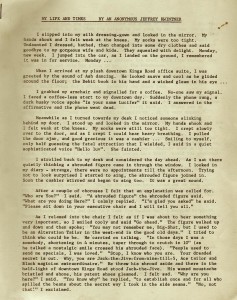 Here is a puzzle. Found among some ephemera at Jot HQ is this six-page photocopy of a typewritten squib entitled ‘My Life and Times, by an anonymous Jeffrey Kwintner’. The piece is obviously a satire on the business dealings of the real-life Jeffrey Kwintner, a well known entrepreneur of the Swinging Sixties who with John Simons co-founded the ‘Squire Shop ‘ in King’s Road, Chelsea and a string of sixteen menswear shops called ‘Village Gate’. He ended up founding the much admired Village Bookshop, Regent’s Street, which eventually went out of business.
Here is a puzzle. Found among some ephemera at Jot HQ is this six-page photocopy of a typewritten squib entitled ‘My Life and Times, by an anonymous Jeffrey Kwintner’. The piece is obviously a satire on the business dealings of the real-life Jeffrey Kwintner, a well known entrepreneur of the Swinging Sixties who with John Simons co-founded the ‘Squire Shop ‘ in King’s Road, Chelsea and a string of sixteen menswear shops called ‘Village Gate’. He ended up founding the much admired Village Bookshop, Regent’s Street, which eventually went out of business.
The satire is written in the first person and is cast in the form of a psychedelic dream sequence, influenced partly by Dickens’ Christmas Carol. In it Kwintner leaves home for his office in King’s Road, where he has some strange encounters with a telephone caller who asks him if his name is Lucifer, a dancer with a debit book in his hand, a cashier who faints at the sight of him, and a shrouded figure who introduces himself as Jack the Jive, an alteration tailor Kwintner had once known from his early days in the fashion business, who suspects him of betraying a trade secret. Soon afterwards a mysterious telephone caller with an oriental voice asks him if he is Mao-Tse- Cohen; then an Irish worker in his warehouse calls him a ‘ heathen Managing Director ‘ and a ‘ Decadent Capitalist Renegade’. Kwintner runs out into the street and takes refuge in a shop called Cassidy One, where he proceeds to empty the till, the assistant crying ‘ Petty cash. God save Malcolm Muggeridge and all who sail in him.’
As Kwintner continues his journey he meets a ‘shrieking teeny-bopper’, who claws at his ‘ life – chiselled face ‘, a ‘ former Naval Officer Archibald McPsst’, who asks him if he wants some ‘dirty photoes (sic) of John Michael or ‘a lock of Lord John’s hair ‘.When McPsst suggests that he call a Manager’s meeting Kwintner, ‘ summoning up all the taste and subtlety’ he can find, replies ‘ get stuffed ‘. Walking down Oxford Street he kicks a passing old lady, jumps on a traffic warden and fires a ‘flute-playing hippy type manager ‘for no reason. Wondering what next he could do ‘for kicks ‘he walks to the nearest Take 6 shop, where, sitting in the window, he spies ‘old friend ‘ Hymie-The Lymie clad in a gold lame suit. They walk together for a while until Kwintner feels a prod in the back and an ‘old mid-European voice speaks to him :
“ Do not move. Raise your arms in the air and proceed to say after me, the following: ‘ All my staff are human beings; all my customers are nice people ; I will give my staff more money, and time off, and I will love all my customers’. Now empty your pockets and go to the nearest Antique Shop and ask to be arrested for being an exploiting, thick-skinned son-of-a-bitch…”
Kwintner realizes that this mysterious figure was his old enemy, the ‘dreaded Spirit of Xmas Past’, who had followed him for years. He boots him on the shins and runs off to a clothes shop called Gary Elliot’s. In the final scene Kwintner addresses his employees in ‘Squire Tox’ and promises to grant them their wishes—‘ a proper lunch hour, and tea breaks, and everything you really want’ if they reveal their secret wishes to him. When he declares that he wants them to live with Joy in their hearts and with ‘ a wonderful feeling of love for everything and everybody ‘ they disappear in a puff of smoke. The squib concludes with Kwintner walking towards the sea, where he meets an angel who declares that his work is over, Raybeck have ‘ spread the word’ , and that he has now become ‘ a fully enlightened out of work Lunatic .’
All the contemporary references to the various fashion outlets of the ‘Swinging Sixties’ date this satire to the London of 1967 – 71 at the latest, although some of the boutiques mentioned traded beyond 1971. The writer seems very familiar with the world of fashion and the contributions of Kwintner to it, and evidently disliked what he felt were his divisive business practices– so he may have been an aggrieved employee with some literary talent who worked in one of his shops. The writer, who betrays a certain degree of anti-semitism, may lack the sharp ironical touch of a professional journalist on a satirical magazine such as Private Eye, was witty enough to convey his message about Kwintner. Perhaps someone out there in the Jottosphere knows who the writer was, why they felt so strongly about Kwintner, what happened to him, and whether the squib was published. [R.M.Healey]

oh dear, someones life has been a disappointment……………………………………………..